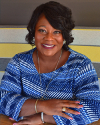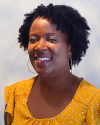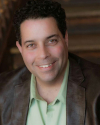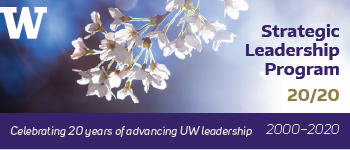
A message from Ujima Donalson
Assistant Vice President,
Total Talent Management
We are in the midst of dual pandemics, both of which are transforming the nature of our
society. COVID-19 has upended how we work, commute, cook, dine, socialize, celebrate,
shop and vacation, while isolating us from family and friends and creating economic
insecurity. Many have been ill themselves, had illness in their households, family, or
social circles, or have lost loved ones. Racism — brought to the forefront by racial
violence — has challenged many of us to (re)examine our history, personal
responsibility, societal structures, organizational policies, workplace dynamics,
justice system, and government and has sparked a new civil rights movement around Black
Lives Matter and antiracism.
Through all of this, the amount of angst, uncertainty and distress that people are
experiencing cannot be overstated. The pace of change is rapid and the future continues
to unfold in unanticipated ways. As leaders, we may feel as if we’re blindly steering a
ship through a storm in uncharted waters. Meanwhile, our crew is looking to us for
answers. I believe what many people need more than anything right now is a safe harbor.
So, my answer is to be gentle and kind, with yourself and with others, and in the words of Dory from Finding Nemo, “Just keep swimming.”
Read
More

Coping with toxic racism: the past is rooted in the present
Ebonee Anderson, Diversity Recruiter, UWHR Recruitment and
Staffing
Reprinted from UWHR’s DEI
Blog; originally posted July 21, 2020.
How we choose to frame the perils of racism in the history of this country consequently
impacts how we address the issues of racism today. The past is rooted in the present.
The tragic murders of George Floyd, Ahmaud Arbery, and Breonna Taylor was not the first
“wake-up” call for America. Nor is seeing Latinx children and families seeking asylum
detained in “cages” at ICE Detention Centers, or Asians being the target of xenophobia
during the Covid-19 Pandemic. Black, Indigenous, Asian, Latinx and People of Color have
been sounding the alarm of systemic racism for generations only to have the snooze
button hit on their realities time and time again.
Racism, white supremacy, anti-blackness, and xenophobia culture has been embedded in the
socio-economic systems of America for centuries. This is evident in the colonization and
attempt to eradicate the indigenous people of the land, to slavery, to the Chinese
Exclusion Act of 1882, to segregation and Japanese internment camps. And this is evident
in the present day from disparities in health care access and outcomes, to achievement
gaps and the criminalization and mass incarceration of black and brown individuals,
to the realities of race and police brutality being symbolized in the dangerously false
accusation of Amy Cooper or watching in disbelief as George Floyd grasped for life while
crying out “I can’t breathe.”
The devastation of recent tragedies have rightfully sparked unrest and protests, but
more often than not, this kind of racially forged trauma is not recorded, does not
receive media attention, and does not go viral.
Read
More

Transgression and transformation
Jeff
Leinaweaver, Ph.D., Senior Organizational Development Consultant, Professional
& Organizational Development
I first read bell hooks’ “Teaching to Transgress: Education as the Practice of Freedom”
(1994) during my doctorate studies. Through a method called engaged pedagogy, Teaching
to Transgress is about pushing against the boundaries of learning in order to challenge
racism, sexism, classism and all forms of oppression and identity politics found in the
educational world.
Her writing, thinking and activism inspired me to pursue activist research around the
role of power and oppression found within the personal narratives of transracial and
internationally adopted people of which I identify.
Recently, I have had the pleasure of returning to hooks’ work as a source of
inspiration. In it, there are myriad lessons for educators, for those of us in the
University community and for anyone engaged in racial justice and social transformation.
I’ve been searching for language and methods to capture the mutual empowerment,
reciprocity and trust-building needed to foster deep dialogue and respond to the surge
in the Black Lives Matter movement. I’m drawn to hooks’ insights on power, engaged
pedagogy and institutional transformation and how she highlights the ways in which each
are integral to disrupting the status quo while building partnerships for an anti-racist
society.
Read
more

My allyship journey
Catherine
Bachy, Organizational Excellence Partner, Professional & Organizational
Development
“If you have come here to help me, you are wasting your
time, but if you have come because your liberation is bound up with mine, then
let us work together.” ~ Lilla Watson
When I worked for a large corporation in the early 2000s, my boss and I were reviewing
resumes for a position for which he was the hiring manager. He noticed that one
candidate had been a board member for a well-known LGBTQ+ social justice organization.
“She must be gay,” he said, “why else would she join the board for a gay organization?”
Having recently been hired, an “out” gay person myself, I just looked at him, puzzled by
the assumption he was making. “Not necessarily,” I responded. “Maybe she has other
reasons, like caring about social justice.” Our conversation ended.
Several years later, I was invited to join that same LGBTQ+ social justice organization
as a board member. With an infant child at home and a demanding full-time job, I
hesitated to pile more on my overflowing plate. In the end, the organization’s executive
director persuaded me. She felt my voice as a parent would add to the diversity of the
board members. That sealed it. Serving on that board alongside members of different
races, genders and sexual identities for close to ten years, I experienced what I see as
“allyship” in the work of that team.
Read
More


Leaders are readers
Lee Davis, Training
& Organizational Development Consultant, Professional & Organizational
Development
One morning in December 2016, I attended my first Strategic Leadership Program (SLP)
workshop. As a newly hired member of Professional & Organizational Development, I was
attending to appreciate the full SLP experience as a participant and as a future
co-facilitator of, and contributor to, this award-winning program.
Ujima Donalson engaged every participant in the room as an extremely skilled
facilitator, practitioner and peer. I was rapt! And then, there it was, the statement
that would have a profound effect on me: “Leaders are readers,” Ujima proclaimed, and
then once again, “leaders are readers!”
I’ve always been an avid reader, so Ujima’s proclamation resonated with me on a personal
level and also prompted a seismic shift in perspective. Of course! Leaders are readers.
Reading represents a quest for greater knowledge and understanding, a willingness to
open ourselves up to different perspectives, and a veneration of lifelong learning and
development — all of which are also keys to being a great leader.
Read
More
DEI resources: A list of lists
You may feel as if you’ve been inundated with recommended books, websites, TED Talks, and
the like. For those who are clicking every link and still just can’t get enough, here’s
a short list of UW lists.
|








